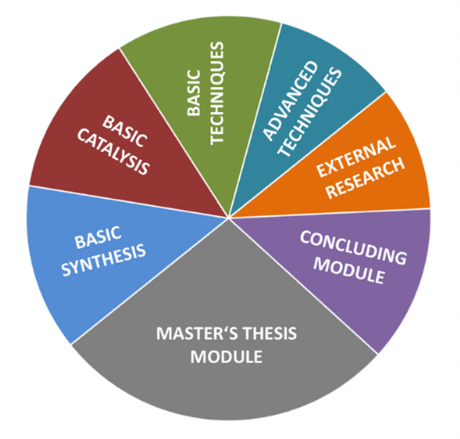SynCat Curriculum
Study info
The SynCat curriculum is composed of seven modules which reinforce one another and are closely interlinked.
Each module deals with the synthesis and characterisation of molecules and materials in an interdisciplinary way. The standard period of study is four semesters.
The first year‘s basic modules Synthesis SYN and Catalysis CAT teach the basic principles and modern applications of synthetic and catalytic chemistry. They are divided into several lectures (compulsory and compulsory elective), seminars and lab courses.
Selected physical, analytical and theoretical concepts as well as methods and experiments are discussed in direct relation to molecular transformations and relevant molecules. To reinforce the synergy of theory and practise, the modules Basic Techniques TEC and Advanced Techniques ATEC are directly related (molecularly) to their preceding basic modules SYN and CAT. Focused seminars are dedicated to the preparation and defence of a research plan and the knowlegde in English; the most important language in natural science and technology.

External Research module RES-EX aims to pair research excellence with internationality, adaptability and social competence. During their stay at a university or industrial company abroad, students prove that they are quickly familiarized with challenging research topics and, after two months of practical work, are able to submit a report of their scientific results.
In the Concluding module CON and the Master‘s Thesis module MAT, the students first undergo individual preparation for advanced research-related synthetic and analytical techniques, before undertaking the Master‘s Thesis; their first comprehensive independent research project. The Master‘s Thesis project can be undertaken in any SynCat professor‘s laboratory or those of cooperation partners (including those based abroad and in industry).
The three basic modules each conclude with an oral module examination. The grades of these examinations are included in the overall grade with 20% each, while the grade of the Master's thesis contributes the remaining 40% percent.

Recommended course of study of the SynCat program:


